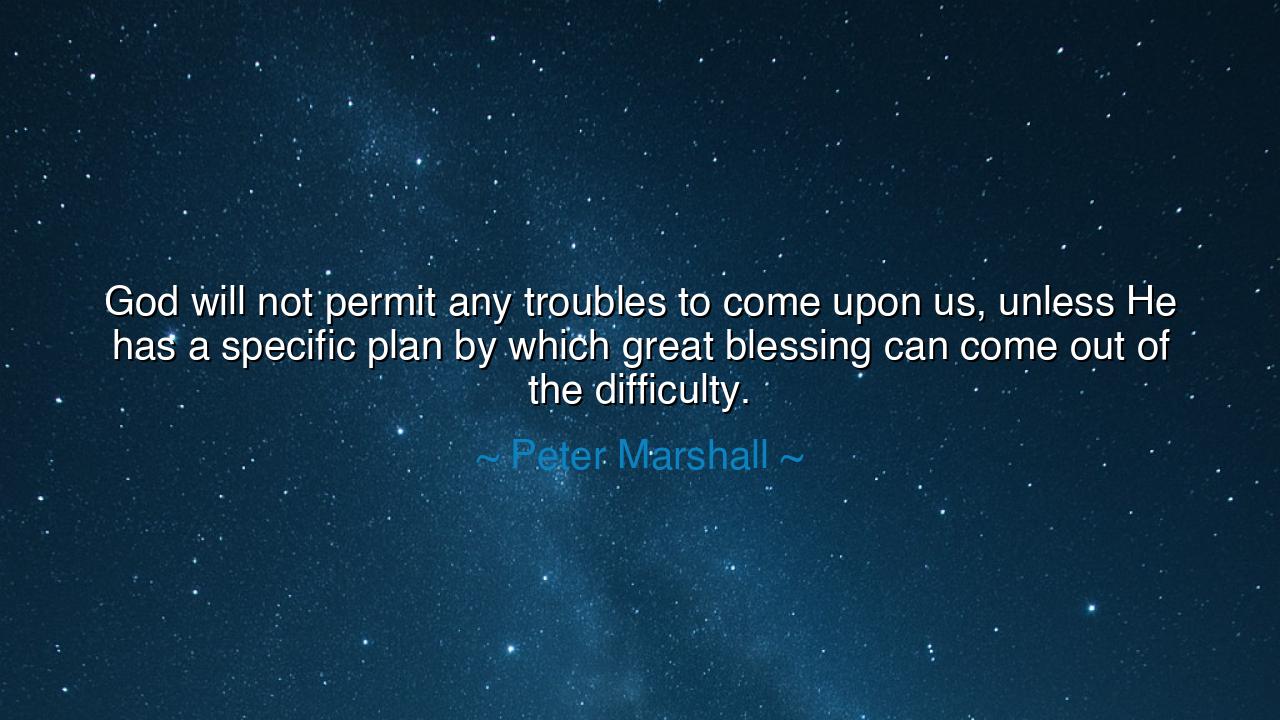
God will not permit any troubles to come upon us, unless He has a
God will not permit any troubles to come upon us, unless He has a specific plan by which great blessing can come out of the difficulty.






“God will not permit any troubles to come upon us, unless He has a specific plan by which great blessing can come out of the difficulty.” Thus spoke Peter Marshall, a preacher of profound faith and luminous courage, whose voice once stirred a nation to look upward amid its trials. These words, though modern in tongue, carry the weight of eternal truth—the same truth that sustained the prophets, the apostles, and all who have walked through shadow toward the light. In this saying, Marshall reveals the mystery of Divine Providence: that suffering is not senseless, that pain is not purposeless, and that behind every storm lies the guiding hand of God, working unseen yet unfailing.
The origin of this quote can be traced to the life and ministry of Peter Marshall, who served as chaplain of the United States Senate in the mid-twentieth century. He was a man who had tasted hardship and yet spoke always with hope. Born in poverty in Scotland, he labored through adversity to become one of America’s most beloved spiritual leaders. From the pulpit, he reminded his listeners that troubles are not punishments but instruments—tools in the hands of a wise Creator shaping the soul for higher purpose. His faith was not born of ease, but of the conviction that God’s plan is larger than human understanding, that even pain can be a doorway to grace.
“God will not permit any troubles to come upon us, unless...” These words suggest not the absence of suffering, but its divine boundary. God permits, but He does not abandon. He allows the fire, but not without purpose; He allows the wound, but not without healing in store. Like a master sculptor, He strikes the stone not to destroy it, but to reveal the form hidden within. Thus, every sorrow that enters a believer’s life is weighed, measured, and directed toward blessing. To the faithless, trouble is chaos; to the faithful, it is craftsmanship.
Consider the story of Corrie ten Boom, a woman who endured the horrors of the Nazi concentration camps. In that dark abyss, she and her sister Betsie clung to faith, believing that their suffering was not meaningless. Betsie, even in her starvation and pain, whispered, “There is no pit so deep that God’s love is not deeper still.” Out of their agony came redemption: when Corrie survived and emerged, she became a messenger of forgiveness, teaching millions that light can rise even from the depths of evil. Her life stands as living proof of Marshall’s words—that God’s plan transforms tragedy into testimony, and suffering into sanctification.
When we look upon our own trials, we often see only the immediate pain. We ask, “Why this? Why now?” Yet faith teaches us to look not with the eyes of flesh, but with the eyes of eternity. The farmer does not curse the plow that breaks the soil, for he knows it prepares the ground for seed. So too, God breaks open the hardened places of our hearts to plant the seeds of compassion, patience, and strength. The harvest comes later—when the pain has softened, when time reveals the hidden design, and when the soul stands taller because it has bowed in humility before the will of Heaven.
This teaching, though comforting, demands courage. For to trust that every difficulty bears a blessing is to surrender the illusion of control. It is to believe that wisdom is woven through mystery, and that even unanswered prayers are answered in ways beyond our sight. It calls us to endure with grace, to wait with hope, and to act with faith. When grief comes, do not despair; when loss comes, do not curse the heavens. Say instead, “This too is permitted for a purpose.” And though your heart may tremble, it will not break—for it will rest upon the assurance that God’s plan is never cruel, only concealed.
Therefore, O child of faith, when troubles come upon you—and they surely will—remember Peter Marshall’s words. Remember that no suffering escapes divine intention, and no tear is wasted in the sight of the Eternal. Trust that the storm you endure is shaping your soul into something vast and radiant. Look not only for relief, but for revelation. For in every sorrow that He permits, God plants the seed of a greater joy, waiting to bloom in its appointed time. Walk, then, through the valley with your eyes lifted high, knowing that when the dawn breaks, it will shine more brilliantly because of the night that came before.






AAdministratorAdministrator
Welcome, honored guests. Please leave a comment, we will respond soon